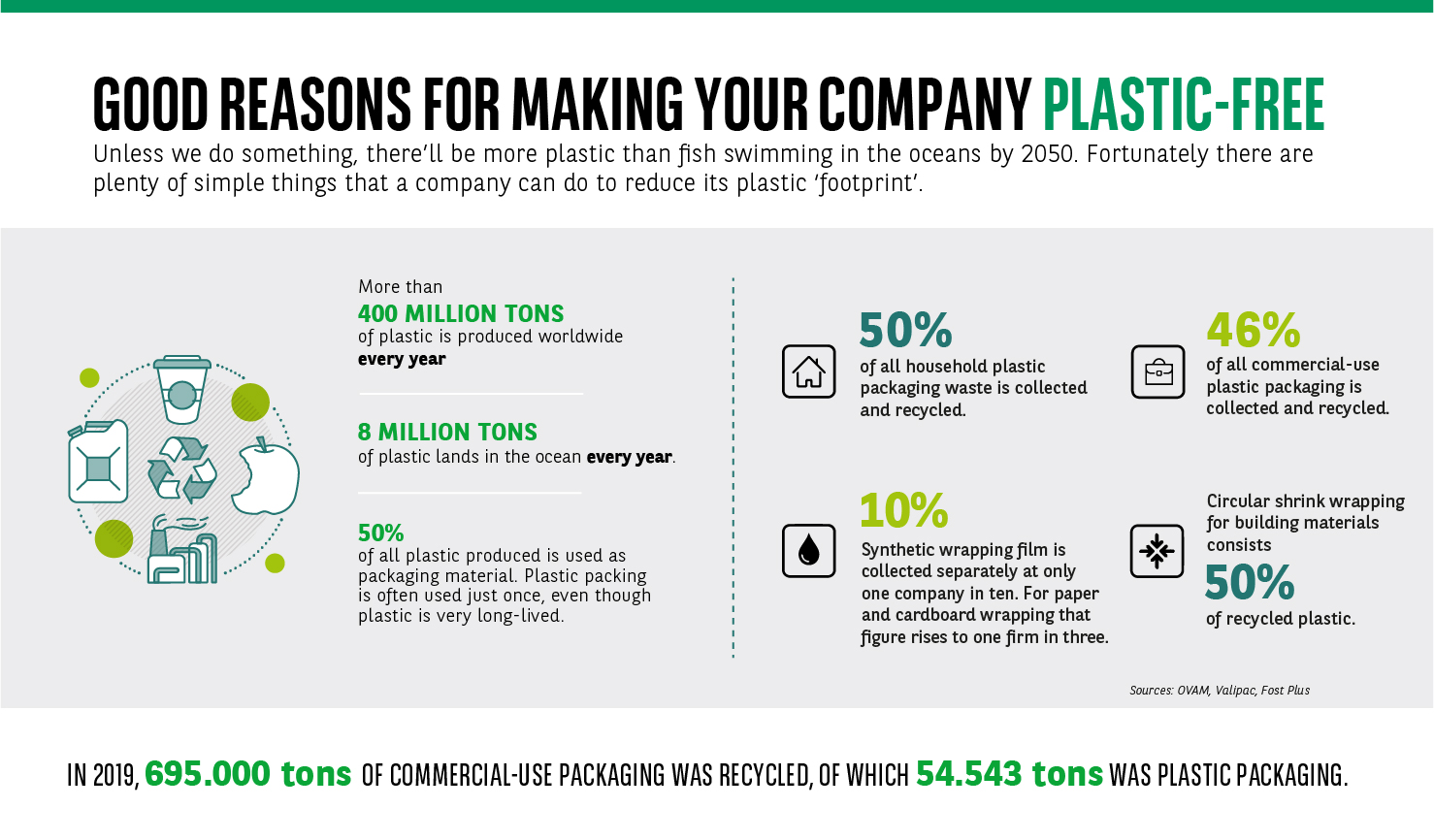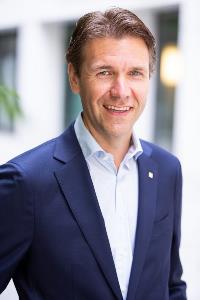What if the future of sustainable business is at the bottom of the ocean for once? Marine biodiversity contains resources that can meet the environmental challenges of many sectors. Perhaps yours, too. Find out more during an online event about the promising blue economy on 11 March 2021.

Blue is the new green
71% of our planet consists of water. Seas and oceans play a crucial role in our climate, and coastal areas can capture up to five times more CO2 than tropical forests. The blue economy wants to benefit from all these advantages to improve both the environment and our well-being,
With local being the keyword. And that's where the difference lies with the green economy, which also focuses on the environment and health, but not always in such a sustainable and smart way. Eating organically grown quinoa from Ecuador, for example, is healthy and eco-friendly, but transporting it here is expensive and creates high amounts of pollution.
Offshore sustainability
What does the underwater world have to offer that can be reused, recycled or converted into new sustainable products? A lot, it turns out, as the unique properties of organisms such as algae, starfish, jellyfish or sea cucumbers can be transformed into sustainable products with high added value. This is a process that requires creativity and innovation, and is already with us today.
For your sector, too
The blue economy is expanding rapidly and could bring about a revolution in a wide range of sectors such as healthcare, food, the plastics industry, cosmetics, energy and even aerospace. It is fully capable of helping companies transform their traditional activities into a sustainable model. And in Belgium's ports, the country already has a huge advantage and excellent access to coastal and offshore areas.
Another scoop of microalgae?
Microalgae, for example, offer a lot of promise, as they can renew themselves and thrive both in the desert and in the ocean. They contain many healthy components, such as proteins, that can be used to develop food products.
Sustainable plastics
When discussing the oceans, the plastic problem is never far away. Human beings are producing more and more plastic as the world's population grows, yet the problem with the existing plastic is that it's nigh on impossible to recycle as its components are hard to separate. By making a completely different type of plastic from biomass, its recycling is already considered at the design stage. A large amount of biomass remains unused in the oceans, and using smart, natural polymers could revolutionise plastic production, for example. These polymers are capable of self-renewal and can adapt to their environment.
Who will pay for it?
Great ideas, you think, but who will pay for them? The financial sector certainly wants to play a role in this revolution and is prepared to take risks and invest in new technologies, production systems and R&D.
This commitment was formalised in various ways during the climate week in New York at the end of September 2020. BNP Paribas signed the Principles for Responsible Banking (PRB) and joined the UNEP FI's Collective Commitment to Climate Action, a partnership between the United Nations Environment Programme and the financial sector. In terms of the maritime sector, the Bank committed to working with customers to preserve and sustain the oceans. Read more about this commitment here (only available in French).
Would you like to find out whether the blue economy could make a difference to your sector?
Sign up here for a free online event on this subject on 11 March 2021 (in English only), organised by BNP Paribas Fortis Transport, Logistics and Ports Chair.
15.12.2020
Sunglasses that can help save the oceans
Yuma Labs makes sunglasses from recycled PET bottles. The Belgian firm has grown from a one-man startup into a company that manufactures items for other brands as well. But can the firm combine growth with sustainability? At BNP Paribas Fortis we certainly think so.
Yuma Labs (originally named YR Yuma) is the brainchild of Sebastiaan de Neubourg, explains his business partner Lenja Doms. She tells us: "Sebastiaan was working as a consultant, but he was itching to set up his own business. His idea was to use a 3D printer to make sunglasses from recycled plastic. He then found out at first hand why no-one had tried this before. Because it proved to be quite a bit harder than expected,” laughs Lenja.
Crowdfunding
By 2017 Sebastiaan had a workable prototype and he started a crowdfunding campaign for his sustainable sunglasses. It was an immediate hit. However, the project wasn’t first and foremost about achieving successful sales, reveals Lenja. “Sebastiaan saw the sunglasses primarily as a tool for making people aware of the basic principles of the circular economy. There’s no such thing as waste. A used Polyethylene terephthalate (PET) bottle provides the raw material for a new product, such as a pair of sunglasses.” And to complete the circle, the customer is encouraged to trade the sunglasses back in at the end of their life, in exchange for a new pair at an attractive discount.
More expensive
Sustainable manufacturing, as Yuma Labs does it, inevitably means that the final product is more expensive. “Fully twice as expensive,” Lenja points out, explaining: “We certainly don’t want to see the circular economy pigeon-holed as the province of the elite. We already take account of the entire life-cycle of a product, and we take responsibility for the recycling and re-use of the materials. And let’s be quite clear about this: that’s more costly than just putting a product on the market without worrying about what happens to it later.”
Aiming for growth
In summer 2019, Lenja Doms and Ronald Duchateau came on board the Yuma team. This provided an opportunity to broaden the focus and look further than the consumer market. This month, Yuma Labs announced a collaborative project with a major fashion company. This upscaling will enable Yuma Labs to reach out to a much larger audience.
A good mix
In order to grow, a business needs financial resources. Yuma Labs has looked into quite a number of possible solutions, says Lenja. “These days there are a lot of initiatives designed to support sustainable businesses – from banks, the government and private investors. We’ve always tried to find the right balance between our own capital and external finance, and to achieve a good mix of different forms of finance between capital, grants and loans.”
Lenja has a golden tip for other businesspeople in the circular economy: "All too often I observe that the economic side of the story is neglected because companies keep on trying to find the perfect solution or the perfect product. There’s no sense in that. You shouldn’t try to be whiter than white.”
Creating added value
At BNP Paribas Fortis, Maxime Prové is the Account Manager for Yuma Labs. He endorses Lenja Doms’ view on this. “Entrepreneurs who set out to do sustainable or social business must also have a desire to create added value, otherwise the business won’t last,” Maxime points out, underlining: “You can’t pursue a sustainable, environmental or social business model unless it’s underpinned by a profit-making scenario. That’s the only way you’ll be able to grow, hire more people and make a greater impact.”

Photo: Karel Hemerijckx
15.01.2021
In the future, will we use CO² to build?
It sounds somewhat futuristic, but today building with CO² is possible. Thanks to accelerates carbonation, CO² is used to produce building material. A sustainable footpath in Ghent illustrates how promising this new technology is.

In mid-December, CO2 Value Europe, a think- and do- tank representing the carbon capture and utilisation (CCU) community in Europe, held a webinar about the use of CO2 to create building material. Concrete examples of this sustainable technology were given to illustrate the potential they can offers, especially in the hard-to-abate construction sector. BNP Paribas Fortis and CO2 Value Europe are partners in issues related to financing innovative and sustainable technologies. As an institution, we work hard to promote corporate sustainability.
The second-most polluting industrial sector
As well as being one of the largest in the world, the cement industry's high levels of flue gas emissions also make it one of the most polluting. Cement is a crucial component in concrete, which is vital for the building sector. A sustainable alternative to cement could make a huge difference. One option here is carbonation, also known as CO2 mineralization. While this CCU technology is not yet well known, it has the potential to play a crucial role in mitigating climate change.
Giving nature a helping hand
Carbonation is a natural process, where minerals react with CO2 to create e.g. limestone and dolomite. In nature, this process takes thousands of years, but today, thanks to innovative methods, this time can be cut down to some minutes. This process requires relatively small amounts of energy and can be used to create several different products, including bricks where CO2 is sequestered permanently.
CO2 all the way
The development of CCU technology has accelerated sharply in recent years. We now have cement alternatives that meet the building sector’s technical requirements. There are various ways to store CO2 into construction materials. For example, CO2 can be injected as an alternative to water for hardening cement. What’s more, CO2 can be used to convert mineral waste from steel and mining industries into new products such as aggregates, which can be used as a basis for paving or building blocks.
Good for the planet
Mineralization of CO2 has a significant impact on the environment, because it has an effect at different levels. The annual global reduction in CO2 emissions is estimated to be 250 - 500 million tonnes by 2030 (source CO2 Value Europe).
- CO2 can be captured from flue gas emitted by industrial processes used to create steel, cement, and chemicals, with no need for concentration or treatment.
- CO2 can be captured directly from the atmosphere to create negative carbon emissions, i.e. carbon removal.
- In both cases, the CO2 will be stored permanently in building materials.
- Mineral waste and even construction waste are used together with CO2 to make new building materials, so it reduces landfills and the associated costs.
- Recycling carbon and construction wastes means fewer new natural resources are exploited.
What’s the catch?
New developments are never without their challenges, and this is no exception. Offering a competitive, quality alternative to concrete in a circular economy requires investment and adaptation.
- Factories will have to adapt their plants. Locating them close to significant sources of CO2, like a steel factory, is recommended so the CO2 and the waste fractions do not have to be transported.
- Manufacturing new products takes energy and creates CO2 emissions, even if the products are made using carbon dioxide and waste. It is why renewable energy should be used as much as possible to increase the sustainability of the processes.
- The commercialization of accelerated carbonation technologies is quite recent, and some processes are not optimally equipped for this yet.
- The lack of appropriate regulatory frameworks is also a drawdown to allow for a fast deployment of CCU technologies. This is an area CO2 Value Europe is especially working on.
Despite these challenges, Andre Bardow (Professor of Energy & Process Systems Engineering, ETH Zurich) told us during the webinar that he is convinced CO2 mineralization reduces the CO2 footprint from a life cycle perspective, even more than carbon capture and storage (CCS).
Zero domestic waste
There are already companies producing low-CO2 construction materials around the world. One of them is in Limburg. Orbix, in Genk, has successfully extracted minerals from steel production waste (known as slag) which are used as a basis for eco-friendly concrete stone. Not only is liquid CO2 used to produce concrete stone rather than polluting cement, but residual waste that would otherwise be dumped in landfill is also recycled.
There is a great example of this in Ghent, where Orbix worked with the Flemish research institute VITO to create the Stapsteen project for the city. Visitors can walk on Belgium’s first-ever circular economy footpath in the Leewstraat: 100m2 made entirely from sustainable bricks, saving a full 2 tonnes of CO2.
Do you have sustainability plans for 2021? Our experts at the Sustainable Business Competence Centre can provide advice about innovations like CO2 mineralisation and support your sustainable transition.
29.10.2020
First green hedge in Belgium becomes a reality
BNP Paribas Fortis has become the first bank in Belgium to launch a green hedge. With this product, the bank gives clients the opportunity to integrate their sustainable objectives deep into their business operations.
Sustainability is now embedded in almost every company's mission. Companies undertake numerous ecological initiatives and finance sustainable investments with green loans. BNP Paribas Fortis is going one step further and is also offering its clients the opportunity to cover the financing risk with a sustainable hedge.
A Belgian first

The first green interest rate hedge in Belgium has become a reality. "We are delighted and proud to be able to achieve this first with Katoen Natie as true partners", explains Filip Moens, Head of Corporate Solutions in the trading room at BNP Paribas Fortis. "Katoen Natie already had a green loan with us and wanted to hedge the interest rate risk by switching from a variable to a fixed interest rate using an interest rate swap. Instead of opting for an ordinary interest rate hedge, we have attached additional green terms and conditions that mean Katoen Natie is strengthening its sustainable commitment."
Katoen Natie carried out an interest rate swap, but a green hedge can also be applied to exchange rate or inflation risks. Moreover, having an existing green loan is not a requirement.
Sustainable safety net
The green hedge stimulates sustainability, but goes even further and provides a green safety net, with the client paying a sustainability premium if the proposed terms and conditions are not met. BNP Paribas Fortis does not receive this premium itself, but instead invests it in an environmental project chosen in advance. "At Katoen Natie, for example, we chose a project that plants trees. The effect of this product is therefore twofold. On the one hand, it is an incentive for the client to actually fulfil their ecological commitment. However, if they fail to do so for any reason, the additional premium they pay will be spent on a green project. So it's a win-win situation for the environment", says Filip Moens.
Tailored to your business
"The strength of this product lies in its broad application", emphasises Filip Moens.
"Companies who do not have a green loan but want to integrate more sustainability into their corporate culture, can really make this ambition a reality thanks to the green hedge. The green terms and conditions linked to it are determined by mutual consultation. A lot is possible as long as these are sufficiently ambitious, achievable and measurable. These include switching to 80% renewable energy, making the fleet 100% electric in five years' time, and collecting litter as an annual team-building exercise. Companies can define conditions that are perfectly in line with their corporate culture. The same applies to the back-up project that we finance if the conditions are not met. Here, too, they can opt for a local project close to their heart."
No empty promises
A green hedge reinforces existing green projects and firmly underlines an active green commitment. This therefore concerns more than image. "This product integrates sustainability deeply into business operations and requires a serious and firm commitment from clients", says Filip Moens. "They have to be really motivated to do something about the environment. There is quite a lot of administration involved, such as an annual evaluation report and external audits. However, clients really do make a difference with this green choice."
As a true partner, BNP Paribas Fortis wants to make a positive contribution to companies' projects and growth. The green hedge is in line with companies' current sustainable mindset and fits perfectly with the bank's strategy: to build a positive, sustainable and clean future together with clients.
20.12.2024
Mobility in 2025: Arval’s view
Laurent Mélignon, Corporate Sales Director of Arval, the market leader in full-service car leasing and new mobility solutions, looks ahead to 2025. What does the future hold for the industry and mobility?

Arval is part of the Commercial, Personal Banking & Services division of the BNP Paribas Group. As the market leader, it plays a key role in offering full-service car leasing and new mobility solutions. Laurent Mélignon, Corporate Sales Director of Arval, is thus ideally placed to share his thoughts on what's in store for Arval in 2025.
Arval is the market leader in a sector in flux: how companies and private individuals see and approach mobility has changed significantly. Mélignon sees several reasons for this: "In our country, taxation is the primary driver of many change processes. This taxation is linked to wage costs: many companies see company cars as a tax-friendly alternative for maximising the remuneration they want to pay their staff. Employees, meanwhile, see company cars as a way to be compensated with tangible benefits, without the tax authorities targeting them. In the coming year, the tax framework will continue to evolve in line with this social evolution. The federal mobility budget and the bicycle allowance, for example, or options such as the cafeteria plan or the flex income plan: these are just some of the ways in which companies can use their salary package to motivate their workers."
But Arval's Corporate Sales Director sees even more drivers of change for mobility. Mélignon: "Our entire mobility culture is also changing, a trend that is set to continue in 2025. The younger generation is much less attached to the status that company cars have been associated with for so many years. They are just as happy to hop on a bicycle, take the bus or use car sharing, depending on the company's location, of course. Finally, there are also several macroeconomic factors driving this change. These include the growing traffic crisis many cities are facing, as well as the increasing awareness of people and economic players regarding the energy transition. We are all gradually seeing the need for change and alternative mobility choices. This has been clear for quite some time."
Flexible complexity
The mobility mix will only become stronger in the future. Mélignon: "That is a big part of our mission: to be and remain a one-stop shop, offering companies the opportunity to think in terms of flexible remuneration. A new employee, for example, someone who is single and without a family, has different mobility needs than their colleague, who is married with two children and has their own home in the countryside or in the city. Now that this need is becoming stronger and more established, Arval is the ideal partner to provide companies with knowledge about mobility and take the burden off their hands. We enable employers to offer flexibility by taking care of the complexity associated with it."
Positive mindset
Mélignon expects the transition to electric mobility to continue in 2025: "When I look at corporate customers, I see that 80% of all new orders are electric. This is quite different from the private market, where we barely reach 20%. The electrification of the Belgian fleet is therefore mainly driven by companies. I see that the government has recently made some announcements and initiatives to slightly adjust and refine the federal mobility budget. In the coming months, more and more people may thus give up their company cars and opt for this adjusted budget instead. Arval can also be of service there, with a positive mindset and a lot of know-how, in our role as a 'full mobility provider'."
Tipping point
According to Mélignon, the shift to electric mobility, which the market has been anticipating for so long, will also have consequences for companies. Mélignon: "We expect to see many more affordable models in 2025. Electric vehicles will no longer be just for the lucky few. This benefits the private market, but it also gives companies more opportunities. In addition, I expect the price of cars with combustion engines to rise. We often receive this feedback from manufacturers. As a result of the Corporate Average Fuel Economy (CAFE) standards, which regulate their CO2 emissions, they will soon have to pay huge fines if they fail to meet these standards. It is therefore in their interest to steer the market towards electric cars. They will also adjust their production capacity accordingly: 'made to order' instead of holding large stocks will become the industry standard from next year."
The road ahead
On a final note, Arval expects the market to open up to smaller and medium-sized enterprises and individual clients in the near future. Mélignon: "We believe that the change in the market will mean that many companies, which currently still favour purchasing company cars or financial leasing, will switch to operational leasing. They will outsource the risk related to, for example, residual value to us. And that is where we can make a difference as the market leader: we see this as a scenario for the near future, for which we are already preparing."
